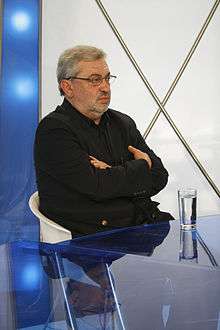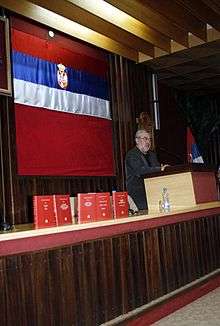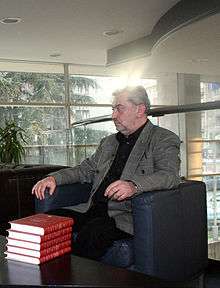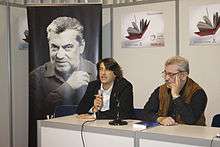Vidosav Stevanović
Vidosav Stevanović (Serbian Cyrillic: Видосав Стевановић; born 27 June 1942) is a Serbian novelist, story writer, poet, playwright, and publicist. he has written over thirty literary works, a political biography of Slobodan Milošević,[1] numerous essays and various other pieces of writing. Stevanović used to write for European newspapers such as Le Monde, Liberation, El País and Expressen.
Vidosav Stevanović | |
|---|---|
 | |
| Born | 27 June 1942 Cvetojevac, Nazi-occupied Serbia |
| Occupation | Writer and publicist |
| Nationality | Serbian, French |
Childhood and early career
After completing primary and secondary education in Kragujevac he went to study in Belgrade in 1961. Initially he studied dental medicine and then literature. But he quickly left the academic world in order to dedicate himself completely to what he saw as the real literature. I did not consider it as a profession but as a vocation, a skill that replaces religion, politics and real life.
After the publication of his first collection of stories (The Scum of Death, Prosveta, 1969), Stevanović became a prominent figure on the Yugoslav literary scene. His writing also made him a subject of political persecution; he was brought into court for a trial which lasted six years. He was neither released nor condemned: the trial simply expired. During those six years the young writer lived in isolation from the public.

He stopped working on the second book of his novel Nišči. The gloomy atmosphere of that period is transposed in his novel Konstantin Gorča which ended the Kragujevac cycle. Vidosav turned to his family life, and started working on his Belgrade stories and collecting material for his novel The Will. His first book of Belgrade stories appeared in 1978. It attracted considerable attention and provoked a few moderate attacks but could not be entered for any awards as he had been blacklisted. Upset by the premature death of his wife Gordana, Vidosav did not pay attention to such things. Fighting with depression, he worked industriously as an editor, gaining respect in his second job. During that period the assaults on him lessened. He became a member of the management of the Writers Society and played an important role in the process of liberation of the poet Gojko Đogo. At the beginning of 1982 he accepted the position of chief editor and then director of BIGZ, a publishing house which was about to collapse. Vidosav changed its programs, activated marketing, reanimated pocketbooks, introduced modern commerce conforming to the principle of the new Japanese business philosophy: do not produce for storehouses! In the next five years BIGZ turned into the most active and most successful publishing house in Serbia and among the best in Yugoslavia. It published books and authors that others were unwilling to publish. It becomes the main publisher of dissidents.
While Yugoslav life was becoming generally more free in the 1980s, Slobodan Milošević attained power first in the Communist party and then in the whole of Serbia. Just before these events Vidosav Stevanović moved to the publishing house Prosveta, trying to save this ineffective company. But Mirjana Marković, Milošević s spouse, wanted Prosveta for herself. Refusing to work under her supervision, Stevanović submitted his resignation. All of a sudden, at the end of 1988, Vidosav, who had to sustain his family of five, was jobless and expelled. All the cultural institutions, artistic societies and colleagues keep silent. The persecution would end three years later in his exile.[2]
Persecution and exile

At the beginning of 1989, Stevanović accepted the position of an advisor in the Sarajevo publishing house Svjetlost, which published the second edition of his collected works. The two years he spent in the multiethnic city of Sarajevo were relatively peaceful. With a few like-minded people, Stevanović established the literary association Independent Yugoslav Writers. One of the constitutive documents proposed the foundation of the professional trade union Svjetlost, which still exists, while the other required that the political parties at the time reveal to the public the archives of the secret services; this initiative was supported only by reformists from Serbia. These archives remained undisclosed even at the beginning of the 21st century. Stevanović founded the Liberal Forum in Belgrade, together with a couple of independent intellectuals. It aimed to act as an intermediary between various political options, but with no success. At the first free elections held towards the end of the 1990s, he participated in the campaigns of the presidential candidate Ivan Djuric. Except the primary liberal and pro-western orientation, we had in our political platform three important aims for Serbia: peace with itself, peace with its neighbors, peace with the world. Still, we couldn’t do much in the middle of the hellish media blitz of Milosevic and the other frenzied nationalists who were everywhere preparing for the war and rapine. (Vidosav Stevanović: Notes). In December of the same year he resigned from his position as advisor in Svjetlost and withdrew to his home village near Kragujevac.
In the first year of democracy, Stevanović, like other people holding the same attitudes as his, could not find publishers for his works. It happened in the same year that I lost my job and couldn’t have my works published, so I was unable to support my family. Nobody noticed this in the city which was caught up in war fever and nationalistic fanaticism. We had to leave. After a physical assault in the street, he fled to Greece with his wife and sons, and going through the experiences described in his writing, started the trilogy The Snow and the Dogs. His first book, The Snow in Athens, was published in Greek, and later on, in Serbian. With help from PEN and his French friends he managed to get to France to promote his book and, following an invitation from the publisher, decided to stay in France. Stevanović gave a number of interviews, appeared in many TV programs, participated in public debates and visited French towns; in all places severely criticizing the regime of Slobodan Milosevic. He joined Ivan Djuric, also an asylum seeker, and his Movement of Democratic Forces. They tried to convince the European public and politicians of how necessary it was to stop the war in the former Yugoslavia. They also tried to help Sarajevo, the city being bombed at the time. After the Dayton Agreement, the two of them criticized the delayed halt of war, the division of Bosnia and the nationalism of the politicians leading the three constitutive nations.
Towards the end of 1995, Stevanović stayed in his house near Kragujevac. Appalled by the political atmosphere, he left again, this time heading first to Prague to write the screenplay for The Balkan Island, and then to Paris. He publicly opposed the positions held by western governments claiming that Milosevic was a guarantee of stability in the Balkans. Over a span of just two years he lost two of his close friends: Dragisa Pavlovic died in Belgrade, and Ivan Djuric in Paris. For the sake of his sons he returned to Serbia during the big demonstrations of 1996–97, joining the opposition in Kragujevac which soon won the favor of the city radio-television, the first free one in Serbia. Six months later, Stevanović resigned from the position of director and left for Paris. In his diary from that period Thieves of Their Own Freedom, published in French, there is a sentence saying: "The opposition is the final line of defense against the regime of Slobodan Milosevic." His wife and younger son joined him, and the three of them demanded and were granted political asylum as a clear case of the triple breach of the Geneva Convention.
Stevanović prepared and finished his political biography of Milosevic, which was published before the subject was ousted from power. New democratic powers in Serbia did not invite Stevanović to come back. The next years were the most prolific in his life. He wrote with great intensity, publishing in various languages and enjoying the French cultural environment. He won two court cases against a big publisher and was given a French award and French citizenship. But he continued to frequently visit the former Yugoslav republics.
Stevanović eventually accepted the position of culture advisor in the Sarajevo city council and spent the next three years in his favorite city. He then retired, returning to his village near Kragujevac.
Works


Stevanović published his first and only collection of poems, Trublje in 1967, in Belgrade. His second book was a collection of stories, The Scum of Death, published in 1969. Two years later he brought out his first novel, Nišći, followed two years later by Konstantin Gorča. These were followed by two-story collections, Suburban Dragons (1978) and The Cesarean Section (1984), which was awarded the Andrić Prize. Perhaps his most popular work is the novel The Will for which in 1987 he received the Serbian Nin Literary Award.
Later works have included:
- The Circle of Love (1988)
- Snow in Athens (1992)
- The Balkan Island (1993)
- Christ and Dogs (1994)
- The Same Thing (1995)
- Abel and Lise (2001)
- Milosevic: The People's Tyrant (2001)[3]
- Sybil (2004)
- Demons (2004)
- The Stranger who is Staying with You (2008)
- Totally Consternated by that Night Monster (2008)
- Iskra (2008)
He has three as yet unpublished works, and two books of his published journals (1988–1993).
He also has written the following plays:
- My Lazar!, Belgrade (1981)
- Tonight is a Night
- Yugoslav Drama Theater, Belgrade (1983)
- The Last Visitor, Scena (1983)
- Our Mother's Suitcase, National Theatre, Belgrade (1984)
- Far Away, Over There, Belgrade, (1985)
- Vuk Stefanovič Karadžić, Belgrade (1987)
- Jovana of the Underground, Paris (1993)
- Ethnic purification, Nota Bene, Paris (1994)
- Three Sister, Paris-Botunje (1996–2001)
- People is Waiting for the Earthquake, Botunje-Paris (1996–2001)
- A Permanent Rehearse, Paris (1988–2001)
- Volter, Volter-Ferne (1999)
- Good Night and Thanks for your Attention, Sarajevo (2004)
- Medea, the Fortune-Teller, Paris-Sarajevo (2006)
- Irena Dubrovna, Botunje (2009)
He wrote two screenplays: My Lazar! and The Balkan Island, with Lordan Zafranović. He is also the author of fifteen radio dramas, numerous literary criticisms, essays and newspaper articles.
The fiftieth anniversary of the beginning of his literary career was accompanied by a book dedicated to his life and writings and an international conference at the University of Kragujevac in March 2011.[4]
Awards and affiliations
- Isidora Sekulić, 1968.
- Mladost, 1970.
- Milan Rakić, 1971.
- Ivo Andrić Award (Yugoslavian, later Serbian literary award), 1985, for his short stories
- NIN Prize (Yugoslavian, later Serbian literary award), 1986, for his novel Testament
- Civis media prize, 1995.
- Ordre des Arts et des Lettres, 1999, top literary honor from French government, for his body of work
- Member of the Liberal Forum, 1989–00, a liberal political forum advocating democratic reforms in Yugoslavia
- Co-founder, Belgrade Circle (Beogradski Krug), 1989–00, a community of activist intellectuals opposed to Milosevic, war and isolation
References
| Wikimedia Commons has media related to Vidosav Stevanović. |
- "Milosevic: The People's Tyrant". Us.macmillan.com. 4 December 2009. Retrieved 8 March 2013.
- Perlez, Jane (27 February 1997). "Journalists Prepare to Take on Serb President". New York Times. Retrieved 8 March 2013.
- Stevanovic, Vidosav (23 July 2004). Milosevic: the people's tyrant, Google books. ISBN 9781860648427. Retrieved 8 March 2013.
- Vidosav Stevanović
